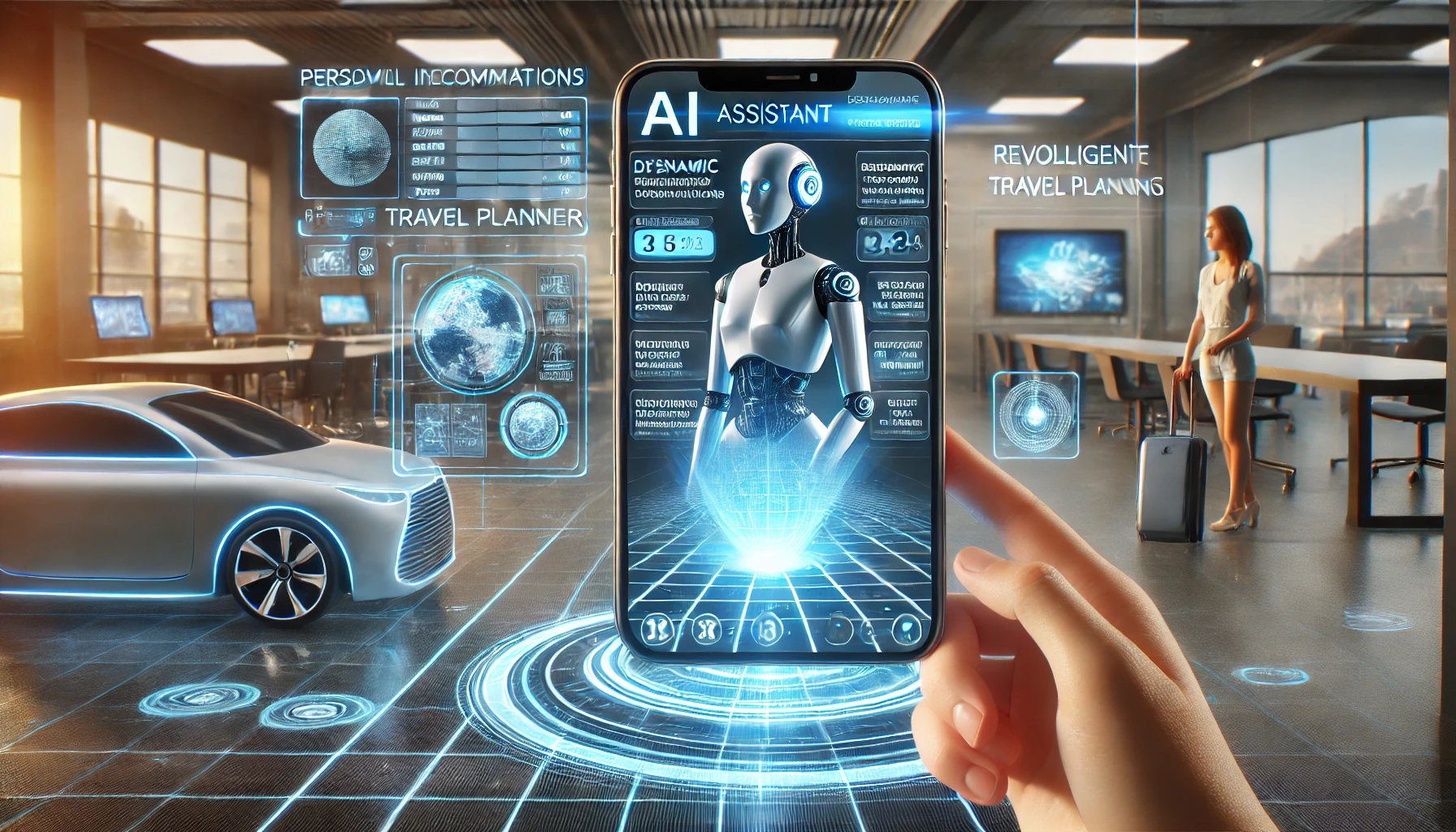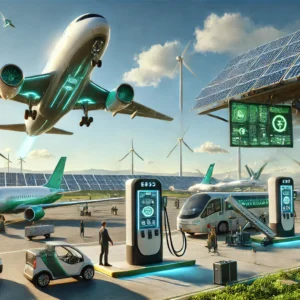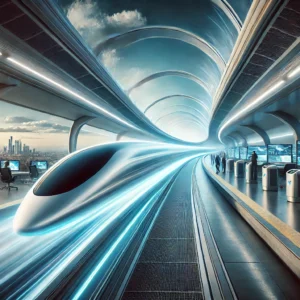
Imagine a world where your entire trip is curated just for you—no more endless research, no more generic recommendations. In 2025, AI travel planners are transforming the way we explore the world by creating personalized itineraries based on your unique preferences and data analytics. These advanced apps are not only redefining the travel experience but are also reshaping the tourism industry, government policies, and global business strategies.
The Dawn of Personalized Travel
The concept of travel planning is undergoing a revolution. Traditional methods that relied on guidebooks and static websites are giving way to dynamic, AI-powered platforms that learn from your past trips, social media activity, and even your mood. Imagine an app that suggests the perfect blend of cultural experiences, adventurous escapades, and relaxing getaways—all tailored to your interests and budget.
These intelligent travel planners analyze vast amounts of data—from weather patterns and local events to hotel reviews and flight prices—to generate a detailed itinerary that maximizes your enjoyment. By using machine learning algorithms, these platforms continuously improve their recommendations, ensuring that each trip is more personalized than the last.
Key Benefits of AI Travel Planners
- Tailored Experiences: Customized itineraries that align with your interests, whether you’re a foodie, history buff, or thrill-seeker.
- Time and Cost Efficiency: Automated planning saves you hours of research and can optimize your budget by finding the best deals.
- Real-Time Updates: Receive instant alerts about weather changes, local events, and travel advisories to adapt your plan on the go.
- Enhanced Connectivity: Integrates seamlessly with booking platforms, ride-sharing apps, and local transport services to offer a cohesive travel experience.
Government Support and Regulatory Insights
Governments around the world are increasingly supportive of integrating AI into the travel sector. Recognizing the potential of personalized travel to boost tourism and economic growth, several nations are investing in digital infrastructure and AI research. For instance, the U.S. Department of Transportation recently announced initiatives to integrate AI travel solutions into national tourism strategies, aiming to streamline travel logistics and enhance traveler safety.
European governments, too, are embracing AI travel planners. Initiatives under the EU’s Digital Single Market strategy include funding for AI research and public-private partnerships that aim to harness technology for improved travel experiences. Such policies ensure that AI travel planners operate within robust ethical frameworks, protecting consumer data while promoting innovation.
These government-backed measures not only foster technological advancement but also create a competitive environment where startups and established companies can thrive. For more details on government initiatives, visit the U.S. Department of Transportation and European Commission’s Digital Strategy.
Political Debates and Industry Perspectives
The rise of AI travel planners has ignited a vibrant political debate about privacy, data security, and the future of work. On one hand, proponents argue that these platforms democratize travel by making personalized experiences accessible to a broader audience. They emphasize that AI-driven itineraries can lead to smarter, more sustainable tourism and significant economic benefits.
On the other hand, critics worry about the implications of mass data collection and potential misuse of personal information. In recent congressional hearings, lawmakers discussed the need for stringent data protection laws to ensure that travel data is handled responsibly. Similar debates are taking place in Europe, where policymakers are balancing the benefits of innovation with the imperative to safeguard individual privacy rights.
These discussions underscore a key point: while AI travel planners promise to transform the travel experience, they must be developed and regulated with transparency and accountability. Ongoing legislative efforts aim to create frameworks that protect consumer rights without stifling innovation.
Cutting-Edge Research and Technological Breakthroughs
At the heart of AI travel planners is sophisticated research conducted by leading universities and tech companies. Research labs worldwide are pioneering new algorithms that leverage big data, natural language processing, and machine learning to predict traveler behavior and preferences.
A groundbreaking study published in the Journal of Artificial Intelligence Research demonstrated how AI can integrate diverse data sources—from social media trends to real-time flight information—to generate highly personalized travel plans. Researchers at institutions like MIT and Stanford are continually refining these models, ensuring that recommendations become more accurate and contextually relevant over time.
Collaborative projects between academia and industry have led to the development of virtual travel assistants that not only plan trips but also adapt to changes while you’re on the move. These innovations are supported by state-of-the-art cloud computing and data analytics, which process vast datasets in real time. For further reading, explore research articles on Google Scholar and IEEE Xplore.
Celebrity Endorsements and Business Leaders’ Views
The transformative power of AI travel planners has not gone unnoticed by celebrities, sports stars, and business magnates. High-profile figures have been vocal about their excitement for personalized travel experiences. A famous actor recently tweeted about how his AI travel app curated an itinerary that perfectly balanced his love for art and adventure, calling it “the future of travel.” Similarly, renowned athletes have expressed their enthusiasm for the efficiency and convenience these apps provide, making it easier to combine training schedules with leisure travel.
Business leaders are also investing heavily in this space. Tech CEOs and venture capitalists predict that AI travel planners will become a cornerstone of the global tourism industry, unlocking new revenue streams and transforming customer service standards. Their optimistic forecasts and multi-million-dollar investments are driving rapid advancements and commercial adoption. For insights into market trends, check out reports from Forbes and Bloomberg.
Perspectives Across Generations
The Wisdom of Experience
For older travelers, the advent of AI travel planners brings a mix of nostalgia and cautious optimism. Many seniors reminisce about the days when travel planning was a hands-on, personal experience—consulting guidebooks, calling travel agents, and relying on word-of-mouth recommendations. While they appreciate the convenience of AI-curated itineraries, they also stress the importance of maintaining human touch and ensuring that technological advancements do not erode the rich, personal interactions that make travel memorable.
Youthful Innovation and Digital Natives
On the flip side, younger generations are all in when it comes to embracing digital solutions. Tech-savvy millennials and Gen Z view AI travel planners as an essential tool that enhances their travel experiences. They are quick to adopt and share their experiences on social media, fueling a cultural shift toward data-driven, personalized travel. This enthusiasm is pushing the boundaries of what’s possible in the travel industry, as innovative startups continue to refine their offerings to meet the evolving needs of a dynamic, globally connected audience.
Social and Cultural Implications
AI travel planners are not just about efficiency and convenience—they also have a profound impact on how we experience culture and interact with the world. Personalized itineraries can transform travel into a deeply immersive experience, allowing travelers to explore hidden gems and local experiences that might otherwise go unnoticed.
For instance, a traveler using an AI planner might discover a quaint, family-run restaurant off the beaten path or an annual cultural festival that perfectly aligns with their interests. This hyper-personalized approach not only enriches the travel experience but also promotes cultural exchange and local economic development.
Moreover, as travel becomes more accessible and tailored to individual preferences, there is a potential for a more inclusive tourism industry. By analyzing diverse data points, AI travel planners can help break down barriers, making travel more appealing to people from all walks of life. However, it’s essential that these technologies are developed with sensitivity to cultural differences and ethical considerations, ensuring that personalization does not lead to stereotyping or exclusion.
Global Business Impact and Revenue Prospects
The global tourism industry is set to be reshaped by AI travel planners, with significant economic implications:
- Market Expansion: AI-driven travel solutions are expected to create new market segments, from niche adventure travel to ultra-luxury bespoke itineraries.
- Revenue Growth: Industry analysts predict that AI personalization in travel could boost the global travel market by billions of dollars, as more travelers opt for customized experiences.
- Investment Opportunities: Venture capital and private equity are pouring funds into startups that specialize in travel technology. With projected market growth in double digits, the economic potential is immense.
- Job Creation: As the industry expands, new job opportunities will emerge in tech development, data analytics, customer service, and travel consultancy. This will not only enhance economic growth but also drive innovation across related sectors.
For more on these trends, consult detailed reports from McKinsey & Company and Deloitte.
Key Milestones and Future Timelines
The evolution of AI travel planners is marked by several significant milestones that highlight its growing influence in the travel industry:
- 2022-2023: Early AI travel apps gained popularity as experimental tools that showcased the potential for personalized itineraries. Pilot projects and initial market entries began during this period.
- 2024: Significant investments from tech giants and venture capitalists fueled rapid advancements. Several governments introduced policies supporting digital transformation in tourism, setting the stage for widespread adoption.
- 2025: A landmark year when fully integrated AI travel planners are expected to become mainstream. Major international travel platforms are set to incorporate these advanced algorithms, transforming global travel standards.
- 2030 and Beyond: The future looks promising as AI travel planners continue to evolve. With ongoing advancements in data analytics, machine learning, and mobile connectivity, personalized travel is projected to become the norm, further revolutionizing the way we plan and experience our journeys.
These timelines are backed by industry forecasts and government reports, ensuring a clear roadmap for the continued evolution of AI in travel.
The Technology Behind AI Travel Planners
Data Analytics and Machine Learning
At the core of AI travel planners is the ability to process and analyze vast amounts of data. These systems use machine learning algorithms to understand user preferences, past travel behavior, and even social media activity. By continuously learning from new data, these apps improve their recommendations, ensuring that every itinerary becomes more refined and personalized over time.
Natural Language Processing (NLP)
NLP enables AI travel planners to interact with users in a conversational manner. Whether you’re typing in a query or speaking to a virtual assistant, NLP technology ensures that your travel needs are understood and accurately translated into actionable plans. This human-like interaction is a critical component in making technology accessible and engaging.
Integration with Global Services
Modern AI travel planners are designed to integrate seamlessly with a host of external services—from flight and hotel booking platforms to local event calendars and weather forecasting systems. This connectivity ensures that your itinerary is not only personalized but also practical and up-to-date. Advanced APIs allow real-time updates, so your travel plan adapts as conditions change.
For more technical insights, explore resources on TechCrunch and Wired.
Real-World Applications and User Experiences
A Day in the Life of an AI-Planned Trip
Picture this: You wake up to a notification on your smartphone—your AI travel planner has curated a personalized itinerary for your upcoming trip. It starts with a recommended early morning flight based on the lowest fare, followed by a suggested hotel that fits your style and budget. Throughout your journey, the app provides real-time updates about local events, dining options, and even weather conditions. When you arrive at your destination, the itinerary seamlessly guides you through a day filled with activities that match your interests—whether it’s exploring a hidden art gallery or sampling a famous local dish.
This level of personalization not only saves time but also transforms travel into a deeply satisfying experience, tailored just for you.
Enhancing Business Travel
For busy professionals, AI travel planners offer a game-changing solution. Imagine scheduling back-to-back meetings in different cities, all coordinated by an intelligent system that optimizes your travel routes and ensures you never miss an appointment. With features like automatic booking adjustments and real-time traffic monitoring, AI travel planners help streamline business travel, boosting productivity and reducing stress.
The Ultimate Leisure Getaway
Leisure travelers are also reaping the benefits. A family planning a vacation can input their interests—beach activities, cultural landmarks, local cuisine—and receive a comprehensive itinerary that caters to every family member’s preferences. From booking tours to suggesting kid-friendly attractions, these AI tools ensure that every aspect of the trip is thoughtfully planned.
Voices from the Industry and Society
Celebrity and Influencer Insights
Celebrities and social media influencers are increasingly vocal about their love for personalized travel. High-profile figures have shared stories of how AI travel planners transformed their vacations into seamless, unforgettable experiences. Their endorsements help popularize the technology and inspire millions of followers to explore new ways of traveling.
Business Leaders on Innovation
Top executives from the travel and tech industries are investing heavily in AI-driven solutions. They see personalized travel as the future of the tourism sector—a way to differentiate their brands and provide exceptional customer service. In interviews with major publications, business leaders have highlighted the potential for exponential revenue growth and market expansion driven by AI personalization.
Intergenerational Perspectives
Older generations often reflect on travel planning as a more labor-intensive process, recalling days of poring over guidebooks and travel brochures. They appreciate the convenience and precision of modern AI tools, though some voice concerns about losing the serendipitous moments that used to define travel. Meanwhile, younger travelers embrace the digital age, eagerly anticipating how AI can unlock entirely new experiences and adventure opportunities.
Social, Cultural, and Environmental Impacts
AI travel planners are set to transform more than just the way we plan trips—they will redefine the very essence of travel. By tailoring itineraries to individual preferences, these apps foster a deeper connection with local cultures and environments. Travelers are more likely to engage with authentic local experiences and sustainable practices, promoting responsible tourism.
Moreover, as travel becomes more personalized and efficient, the overall environmental footprint of tourism may decrease. Optimized travel routes and intelligent booking systems can lead to more sustainable travel behaviors, reducing unnecessary emissions and encouraging eco-friendly practices.
Global Business Prospects and Revenue Insights
The rise of AI travel planners is expected to have a profound economic impact on the global tourism industry. Here’s a closer look at the financial landscape:
- Market Growth: With the increasing demand for personalized travel experiences, the market for AI travel solutions is projected to grow exponentially. Industry analysts forecast that the global travel tech market could reach a valuation of over $50 billion by 2030.
- Revenue Streams: AI travel planners generate revenue through partnerships with airlines, hotels, and local attractions. Additionally, data-driven insights offer valuable opportunities for targeted advertising and personalized promotions.
- Investment Opportunities: Venture capital firms are actively funding startups in the AI travel space, attracted by the technology’s potential to disrupt traditional travel planning. Significant investments are being made in software development, machine learning algorithms, and user experience enhancements.
- Job Creation: The expansion of AI in travel will create new roles in data analytics, software engineering, customer support, and digital marketing, contributing to economic growth across multiple sectors.
For further economic insights, refer to market research from Deloitte and McKinsey & Company.
Future Trends and Key Milestones
The journey toward fully integrated AI travel planners is lined with exciting milestones and future trends:
- 2023–2024: Early adoption phases and pilot programs are underway, with several AI travel apps already gaining popularity for their ability to curate personalized itineraries.
- 2025: This year is expected to be a breakthrough period, with widespread adoption of AI travel planners across major travel platforms. Government initiatives and private investments will further accelerate development.
- 2030 and Beyond: As technology evolves, AI travel planners will become even more sophisticated, integrating augmented reality, virtual reality, and real-time data analytics to offer an immersive, holistic travel experience. Global connectivity and seamless integration with smart city infrastructure will redefine long-distance travel.
These milestones, supported by research from institutions and industry reports, provide a roadmap for the ongoing transformation of travel planning.
The Technology Behind AI Travel Planners
Data-Driven Personalization
At the core of AI travel planners is the ability to analyze and interpret massive datasets. By integrating data from various sources—social media, user reviews, flight and hotel databases, and real-time events—AI algorithms craft itineraries that cater to individual tastes. This level of personalization is made possible by advanced machine learning techniques that continuously adapt to user feedback.
Natural Language Processing (NLP)
NLP allows AI travel apps to interact with users in a conversational manner. Whether you’re inputting your travel preferences through text or voice, NLP technology ensures that the system understands and processes your requests accurately, making travel planning as intuitive as chatting with a friend.
Integration with Global Travel Services
Modern AI travel planners seamlessly integrate with booking platforms, payment gateways, and local transit systems. This interconnectedness ensures that your personalized itinerary is not only tailored to your interests but also practical, providing up-to-date information on flight schedules, hotel availability, and local attractions.
For technical details on these integrations, check out articles on TechCrunch and Wired.
Real-World Applications: Transforming Travel Experiences
Personalized Itineraries for Every Traveler
Imagine planning a family vacation where every activity—from museum tours and beach outings to gourmet dining and local cultural experiences—is customized to suit each family member’s interests. AI travel planners analyze your preferences and past travel behavior to create an itinerary that leaves no detail overlooked. This not only enhances your travel experience but also minimizes the stress of planning.
Business Travel Made Seamless
For business travelers, time is of the essence. AI travel planners can optimize your schedule by suggesting the best flight times, booking meeting-friendly accommodations, and even recommending local transport options that ensure punctuality. This efficiency can lead to increased productivity and a smoother travel experience overall.
Enhancing Cultural Exploration
By curating itineraries that highlight local gems, AI travel planners encourage travelers to explore off-the-beaten-path destinations. This approach fosters deeper cultural engagement and supports local economies by promoting lesser-known attractions and community events.
Voices from Diverse Perspectives
Celebrity and Influencer Insights
High-profile celebrities and travel influencers are already touting the benefits of AI travel planners. Their social media posts, filled with stunning travel photos and personal anecdotes, are driving excitement for personalized travel. These endorsements add a layer of glamour and aspirational appeal, making personalized itineraries the new standard in luxury travel.
Business Leaders and Investment Experts
Top business executives are equally optimistic about the potential of AI in travel planning. They emphasize that personalized travel not only enhances customer satisfaction but also opens up new revenue streams and market opportunities. Industry conferences and panel discussions are abuzz with forecasts that predict exponential growth in travel tech over the next decade.
Reflections from the Older Generation
Older travelers often reflect on the evolution of travel planning with a mix of nostalgia and hope. While they cherish the personal touch of traditional travel agents, many now appreciate the efficiency and customization offered by AI solutions. Their insights underscore the importance of balancing technological innovation with human interaction, ensuring that travel remains a deeply personal and enriching experience.
Youthful Enthusiasm
For younger generations, who have grown up with smartphones and instant connectivity, AI travel planners are not just a convenience—they’re a lifestyle. Digital natives are eager to embrace tools that make travel planning quick, intuitive, and tailored to their dynamic lifestyles. Their enthusiastic adoption is driving the rapid development of new features and integrations that keep AI travel solutions at the cutting edge.
Social, Cultural, and Environmental Impact
The ripple effects of AI travel planners extend far beyond the realm of tourism. By enabling personalized, efficient travel, these systems contribute to a more connected and sustainable world. Here are a few ways they’re making an impact:
- Cultural Exchange: Personalized itineraries encourage travelers to explore diverse cultures and local traditions, fostering a deeper understanding and appreciation of global diversity.
- Environmental Benefits: Optimized travel routes and efficient booking systems can reduce carbon footprints by minimizing unnecessary travel and wasteful itineraries.
- Social Connectivity: By tailoring experiences to individual preferences, AI travel planners help bridge cultural and geographic gaps, promoting global connectivity and mutual understanding.
Global Business and Revenue Insights
The economic potential of AI travel planners is staggering. As more travelers seek personalized experiences, the market for AI-driven travel solutions is expected to soar:
- Investment Surge: Global venture capital and tech giants are investing heavily in AI travel startups. The influx of capital is accelerating innovation and expanding market reach.
- Revenue Projections: Market analysts forecast that the personalized travel tech market could exceed $30 billion by 2030, driven by increased demand for tailored travel experiences and seamless booking processes.
- Job Creation: The expansion of this sector will create new roles in data science, software development, customer support, and digital marketing, contributing to broader economic growth.
- International Growth: Regions with advanced digital infrastructures, such as North America, Europe, and parts of Asia, are poised to become global hubs for AI travel innovation, attracting further investment and talent.
For further economic analysis, explore reports from Bloomberg and Reuters.
The Road Ahead: Challenges and Opportunities
Despite the immense promise of AI travel planners, challenges remain. Key issues include:
- Data Privacy: With personalized travel relying heavily on user data, robust measures must be implemented to protect sensitive information.
- Integration Complexity: Seamless coordination between various travel services—flights, hotels, local transport—requires sophisticated integration and constant updates.
- User Adoption: Bridging the gap between traditional travel planning and high-tech AI solutions requires educating users and building trust in digital systems.
- Regulatory Hurdles: Policymakers need to establish clear guidelines and ethical frameworks to ensure that AI travel planners operate safely and transparently.
However, these challenges also present opportunities for innovation. As technology evolves, solutions that address these issues will further enhance the user experience and drive the adoption of AI travel planners across the globe.
FAQs
Q1: What are AI travel planners?
A: AI travel planners are advanced applications that use data analytics and machine learning to create personalized travel itineraries tailored to individual preferences.
Q2: How do AI travel planners work?
A: They gather data from various sources such as past travel behavior, user reviews, and real-time information on flights and hotels, and then generate customized itineraries using sophisticated algorithms.
Q3: What benefits do AI travel planners offer?
A: They save time, optimize travel costs, provide personalized recommendations, and adapt to changes in real time, enhancing the overall travel experience.
Q4: Are there any privacy concerns with AI travel planners?
A: Yes, as these apps rely on personal data, strong data protection measures and regulatory frameworks are essential to safeguard user information.
Q5: When will AI travel planners become mainstream?
A: With ongoing investments and technological advancements, AI travel planners are expected to be widely adopted by 2025, with continuous improvements over the next decade.
Final Thoughts
The future of travel is here, and it’s personal. AI travel planners are revolutionizing the way we plan our journeys, making travel smarter, faster, and tailored just for you. As governments invest in digital infrastructure, research labs push the boundaries of machine learning, and global business leaders bet on innovation, the travel industry is undergoing a transformative change.
Whether you’re a seasoned traveler seeking efficiency or a digital native craving a unique experience, these intelligent apps promise to elevate your adventures to new heights. With a blend of cutting-edge technology and personalized service, the days of generic travel itineraries are behind us.
Stay tuned for more updates on the latest travel tech innovations by following trusted sources like TripAdvisor, Lonely Planet, and National Geographic. Subscribe to our newsletter for regular insights and be a part of the revolution that’s redefining how we explore the world.
Embrace the journey, explore new horizons, and let AI travel planners turn your travel dreams into reality—one personalized itinerary at a time.





